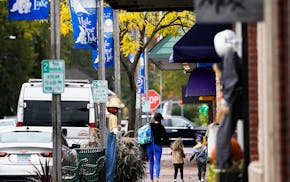A unique water-sharing agreement between Burnsville and Savage appears to be easing the strain on a major aquifer that feeds the Savage Fen, one of the best and rarest examples of a delicate form of wetland.
The water level in the Prairie du Chien-Jordan aquifer in the area of the fen has crept up since 2009, when the two cities launched a $14 million project to convert more than 3 million gallons of water a day from a privately owned limestone quarry into drinking water. The water, previously discharged into the Minnesota River by Kraemer Mining & Materials Inc., is treated in the five-year-old plant funded by the cities, the state and the company.
About one-third of the 3.5 billion gallons of water used by the two cities last year came from the quarry, according to Burnsville Public Works Director Steve Albrecht. The heaviest user is Savage, which gets almost 80 percent of its water from the surface water supply.
Using more surface water is reducing both cities' demand on wells and lessening the pressure to develop more of them in the future, Albrecht said at a recent meeting of the Metropolitan Council's water supply advisory committee.
The increase in the aquifer's water level reverses a decline that began in the early 2000s. "It has definitely taken the edge off impacts [on the aquifer and fen]," Albrecht said. He noted that the arrangement also benefits Kraemer, because it costs less to supply water to the treatment plant than to pump it to the river.
The cities' five-year water supply agreement is due to expire this summer. Albrecht said they are looking to continue the partnership.
In an interview, Ali Elhassan, the Met Council's manager of water supply planning, said the cooperative arrangement is a model of how cities can work together to solve their water needs.
"This looking beyond city boundaries, it's going to be the way of the future," he said.
The results of the Burnsville-Savage agreement come as Prior Lake and the Shakopee Mdewakanton Sioux Community pursue their own water purchasing arrangement. Under the proposed agreement, Prior Lake would buy water from the tribe, which is expanding its water production capacity by adding a new well and expanding a water treatment plant. Those facilities are expected to be up and running this summer.
Prior Lake pumped 820 million gallons of water last year from two aquifers. The city has projected its need will grow to about 876 million gallons in 2016, based on estimates of future growth.
City Administrator Frank Boyles notes that even during the recession Prior Lake was adding more than 60 new single-family homes a year. Home construction has jumped in the past few years, with 149 single-family homes and 39 townhouse units built in 2013.
Prior Lake, Savage and the Shakopee tribe already have interconnect agreements with each other to share water in emergencies like fires or if a community's well is shut down temporarily for maintenance or repair.
"We will still need additional wells of our own over time," Boyles said. A 2012 consultant's report identified the need for a new well in Prior Lake, but the water purchasing agreement with the tribe would extend the timetable for that project. The city is planning to develop a new well costing $950,000 in 2015 and a water treatment plant in 2019.
Elhassan said the Burnsville-Savage water sharing agreement is especially notable because it fits the long-term objective of finding alternative sources to groundwater to preserve supplies in aquifers.
The Met Council has reported that water taken from the Mississippi River now provides about 30 percent of the water used in the seven-county area. Minneapolis, St. Paul and some inner-ring suburbs are the primary users of that surface water. The other 70 percent is groundwater, with outer ring communities being the heaviest users.
Albrecht told the Met Council water committee that Burnsville and Savage are only using a portion of the water discharged from the quarry. That leaves open the possibility that other south-metro communities also could be supplied with water from the quarry site.
"That's something we're going to look at in the future," he said.
Susan Feyder • 952-746-3282

Shop the curbs for free on 'Trash to Treasure Day' in White Bear Lake
Longtime Uptown boutique closing in May

Meet the Athena Award winners: 103 female athletes honored by their schools

Lacrosse lists: 21 top players and the school that's No. 1 for boys and girls

